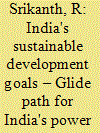|
|
|
Sort Order |
|
|
|
Items / Page
|
|
|
|
|
|
|
| Srl | Item |
| 1 |
ID:
162307


|
|
|
|
|
| Summary/Abstract |
India has adopted the 2030 Agenda during the United Nations Summit held in September 2015. Energy is intimately connected with 74% of the 169 targets related to the 17 Sustainable Development Goals (SDGs) to be achieved by 2030. Subsequently, India has also submitted its Nationally Determined Contributions (NDCs) for the period 2021–2030 to the United Nations Framework Convention on Climate Change (UNFCCC). While the Government of India (GOI) has ambitious plans for enhancing the installed capacity of RE sources, 75% of its electricity is currently generated by coal-fired power plants. As India's electricity requirements grow to meet the aspirations of 1.3 Bi people, it needs a policy framework that integrates all low-carbon energy technologies with coal in such a manner that the reliability, security, and affordability of electric supply are balanced with sustainable development. India also needs to develop innovative strategies to clean up the country's coal sector while enhancing the integration of renewable energy into the National Power Grid. In this context, certain recommendations are proposed in this article for timely implementation by GOI to facilitate the achievement of India's targets with respect to SDG 7 and the NDCs in an efficient and effective manner.
|
|
|
|
|
|
|
|
|
|
|
|
|
|
|
|
| 2 |
ID:
183558


|
|
|
|
|
| Summary/Abstract |
India is enhancing domestic coal production to provide affordable electricity to its people even as it is committed to the responsible use of coal in power plants incorporating the latest clean coal technologies. However, the current regulatory framework for coal mines in India entails a multiplicity of laws, overlap of jurisdictions, duplicity of procedures and inadequate enforcement of environmental laws, which do not augur well for the sustainable development of India's energy security. Harmonization of laws, policies, procedures, and authorities engaged in mining, forest, and environmental governance of coal mines is critical to achieving India's Sustainable Development Goals. This paper examines the legal provisions related to environmental regulation of coal mines in India to identify the thorny issues in the extant regulatory framework. We then propose a comprehensive regulatory framework that includes the constitution of an independent Coal Mines Environment Authority to minimize the adverse environmental impact of coal mines through an integrated approach that will enhance the effectiveness, efficiency, and transparency in the environmental governance of coal mines. The paper outlines the composition and functioning of the proposed Authority which may provide pointers for other coal-producing countries seeking to improve the environmental regulation of their coal mines.
|
|
|
|
|
|
|
|
|
|
|
|
|
|
|
|
| 3 |
ID:
177109


|
|
|
|
|
| Summary/Abstract |
Energy is a key component for economic growth as well as for human development. India is the third-ranking electricity generator in the world but ranks 106th in terms of per capita consumption. Specifically, the distribution of power is the most important link in the value chain of the power sector since it is the cash register for the entire sector. In India, electricity is a concurrent subject shared between the Central and State Governments. While the generation of power has been deregulated since 2003, the supply of power to the consumers is generally carried out by Government-owned power Distribution Companies (DISCOMs). In this paper, the authors analyze the financial distress of DISCOMs in India, and explain how the supply-demand mismatch due to over-ambitious demand projections, the fixed and energy charges of thermal power plants, and the excess procurement of “must-run” renewable sources together contribute to the high cost of power procurement that drives the financial stress faced by DISCOMs. The authors support their assertion with a study of nine DISCOMs supplying electricity to 155 million people in three States and propose policy recommendations for a turnaround of such DISCOMs which can be rolled out with suitable modifications across India.
|
|
|
|
|
|
|
|
|
|
|
|
|
|
|
|
|
|
|
|
|